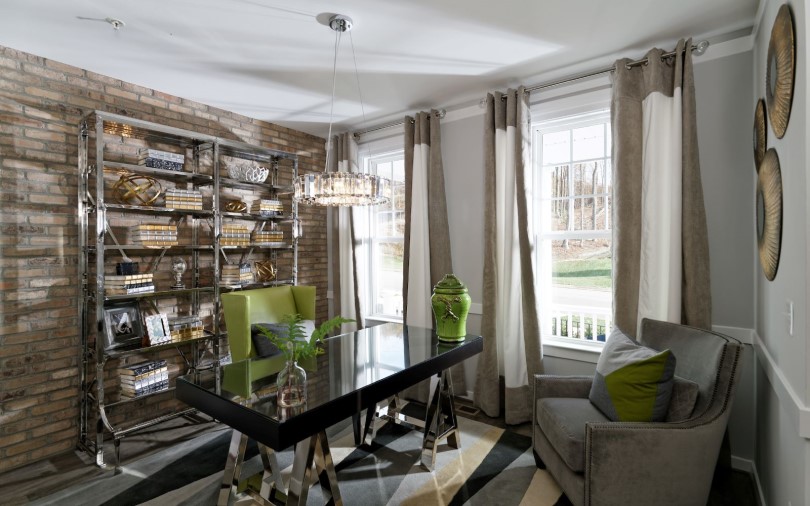How to Turn Any Room into a Home Library

After spending the last year feeling on top of one another in our homes, many of us feel like space is at a premium. The idea of adding something as luxurious as a home library may seem completely out of the realm of possibility. No matter how big or small your space is, creating your own reading oasis is much easier than you might think. Consider these tips when planning your home library designs.
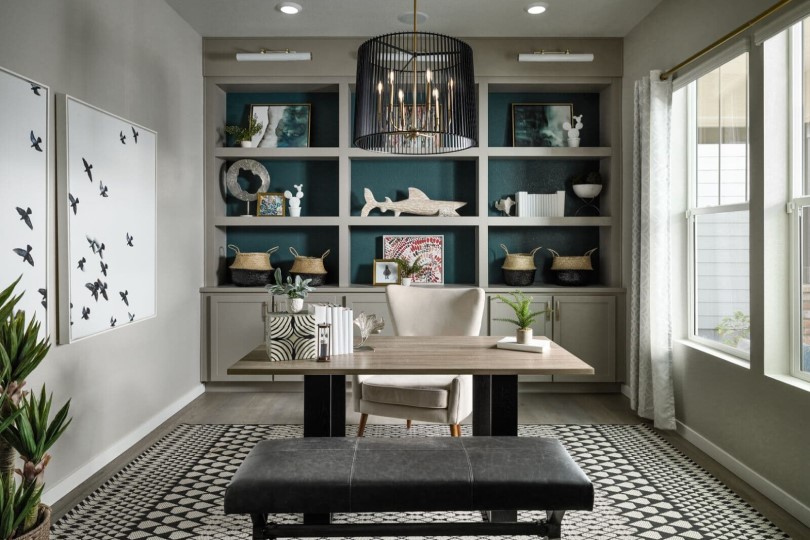
1. Choose your location
Whether it’s an entire room lined with books or a quaint, cozy reading nook, this space should serve as a quiet place where you can unwind. As dreamy as it is to imagine a grand room with tall ceilings and rolling ladders, that’s not the reality for most people. Fortunately, you can easily recreate the same vibes in a smaller room or look at unused corners and nooks that can serve as a small library space. Think areas like the space underneath a staircase, an oversized landing, or any awkward wasted space in your master bedroom. You can also have one of your rooms serve double duty. A home office can easily work as a library with the right storage and furniture. Install built-in shelves or position bookcases along one wall to hold your book collection, office supplies, and home décor. Bonus: you now have an impressive background for your next Zoom meeting. Just be sure to bring in a separate comfy chair (not your desk chair!) to help distinguish between work and relaxation time.
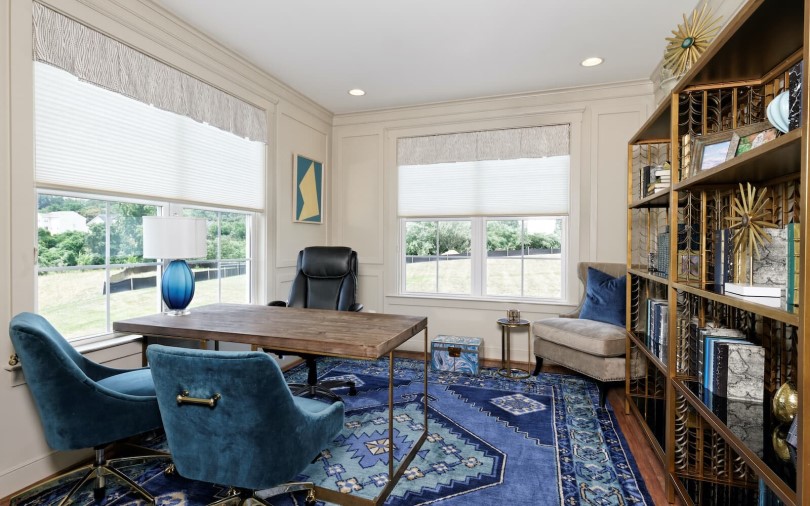
2. Choose a color palette
Just because libraries are supposed to be quiet doesn’t mean they need to be boring. The colors you choose for your home library play an important role in setting the mood. Decorate your home library with as much vibrancy as you did the rest of your home. Just keep in mind that a huge array of colorful spines will likely be the dominant design element so it’s helpful to keep the space relaxing by using one vibrant color throughout, selecting neutral paint, or using a “less is more” approach to furnishings. An overly busy look can be chaotic and not create the feeling you intended.
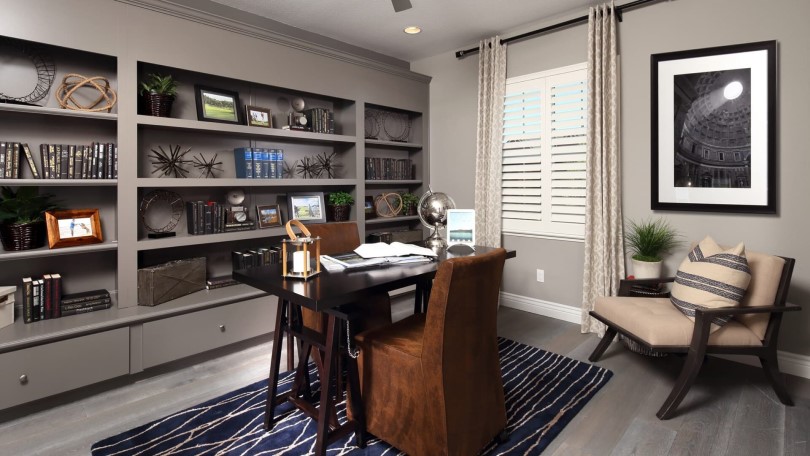
Neutral doesn’t have to mean stark white. Dark, moody colors can add an extra layer of sophistication. Go with navy blue, charcoal, or hunter green combined with natural wood finishes and you have a warm, traditional look. If you do go for the dark masculine tones, be sure to balance it out with plenty of lighting. If you prefer a more modern look, go with a palette of blacks, whites, grays, and metallics and incorporate clean lines. If envisioning the perfect home library evokes images of princesses, soften up the space with light pinks, creamy whites, and gold tones to create a light and airy atmosphere. Prefer more rustic? Incorporate whites, wood tones, and greenery to make your reading spot feel like an outdoor escape.
3. Find quality shelving
When it comes to shelving, your options are limitless: built-in shelving, standard bookcases, unique floating wall shelves, repurposed furniture, and more. Whatever you choose, make sure they’re sturdy enough to support your books and won’t sag over time. A 36” long shelf should be at least 1” thick – go thicker if longer. If your library is serving double duty as something else, include some lower cabinets with doors. It’s a great way to tuck away anything you don’t want on display and gives the eye a break from floor to ceiling shelving.
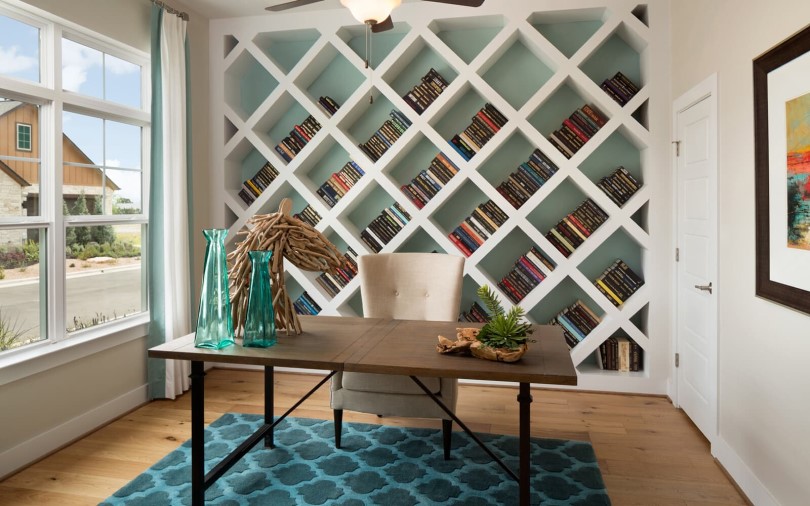
Your shelves can help set the tone of your library. If you’re working in a small space, try a backless bookcase so your eyes don’t stop at the books and keeps the space more open. Go beyond the basic with an out-of-the-box shelving design. Think unique shapes, interesting finishes, or playing on scale and dimension to really make a statement. Not only do you have visual drama, but a great conversation piece as well. If your budget doesn’t accommodate custom built-ins and you can’t find a retail bookcase you love, try adjustable shelves. With the flexibility of their placement, you can easily accommodate short paperbacks and tall coffee table books without wasting space.
Go vertical! Whether you feel short on space or not, almost any room has tons of wasted vertical space. Make a dramatic statement by going up as high as possible. Not only will your shelving take up less floor space, but your library takes on a feeling of sophistication and grandeur.
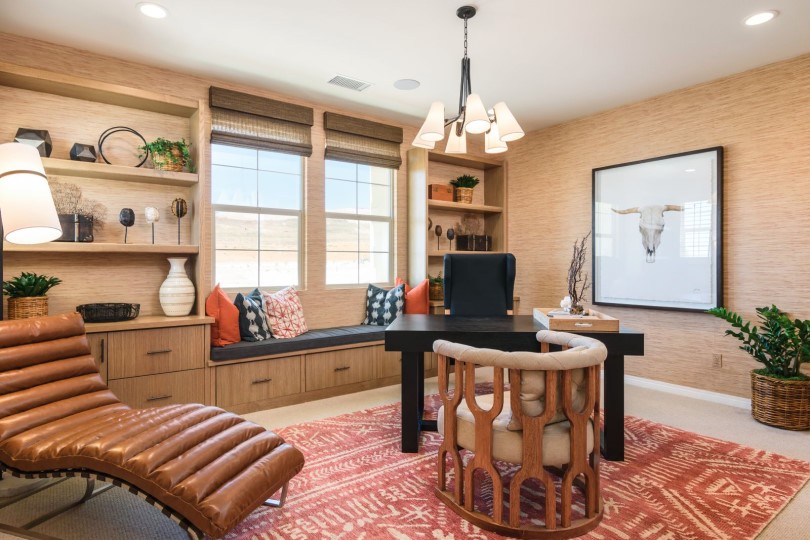
4. Add library furniture
A home library is a space that invites you to curl up with a good book so comfort is king when you’re slipping away into the world of words. Start with a cushy armchair, layer in some plush pillows, top with a blanket, finish with an ottoman, and you have the perfect set up to embark on your next read. If your space allows, size up to a chaise lounge chair for extra room to sprawl out. If you’ve opted for floor to ceiling shelving, the addition of a classic rolling ladder makes your library not only functional so you can reach those higher shelves, but stylish as well. Whether you go the DIY route or find the perfect pre-made ladder, choose a contrasting finish for a handsome accent piece.
Be mindful of clutter as you don’t want to overcrowd a small space or take away from the room’s functionality. If you’re the only person who plans to read here, you don’t need to have multiple seating options. Include a table close within arm’s reach so you have space for a beverage, somewhere to rest your book, store your glasses, or bring in a snack.
5. Organize, organize, organize
There’s something visually satisfying about well-thought-out, organized bookshelves. An easy approach is to color coordinate all of your books. Not only is it bright, striking, and easy on the eyes, but simpler to find a spot for new additions and existing pieces. You can also choose to organize your collection alphabetically, by author, by genre (take it a step further by organizing by title or author within the genre), by size, or keep it a surprise. You’ve probably seen this trend of turning your books backwards (spines facing the back), but many bookworms prefer to see what’s on their shelves. Add some visual flair by positioning your books in a variety of ways – mix them up with some vertical, some horizontal, and a few at an angle.
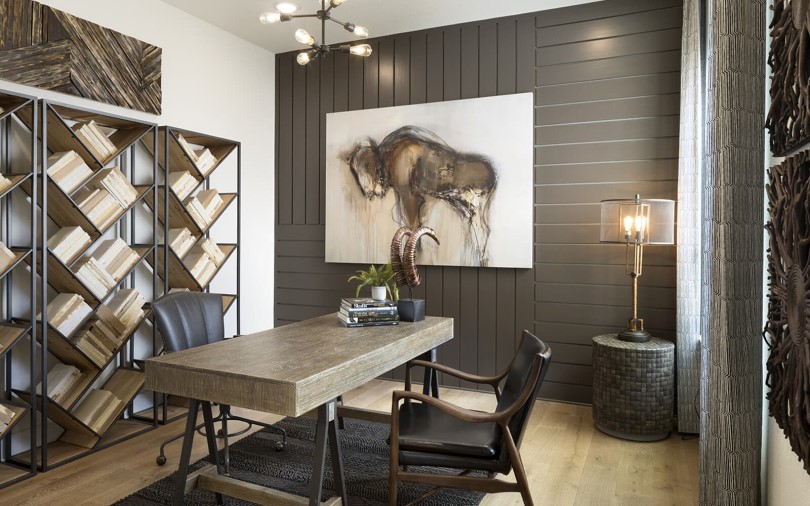
If you have kids, make them feel included in the space too. Give them a spot to read with floor pillows or child-sized chairs. Add their books on the lower shelves for easy reach – just be sure all shelving and heavy furniture is securely fastened to the wall – and keep your more coveted and prized books higher up and away from little hands.
Leave some blank spaces – whether it’s gaps between books or sparsely decorated shelves, give your library some breathing room. Not only does this keep the look edited, but breaks up the visual cluster that book spines can create.
6. Light it up
Don’t skimp on lighting! As pretty as your new home library may be, you need it to function and not strain your eyes when you’re trying to read. If your space has a large window, take advantage of the natural light – it boosts productivity so when you dive into your next book immersed in sunlight, you’ll be flying through the pages. You’ll also conserve power without the use of lamps, as well as enjoy the fresh air and cool breeze coming in from open windows.
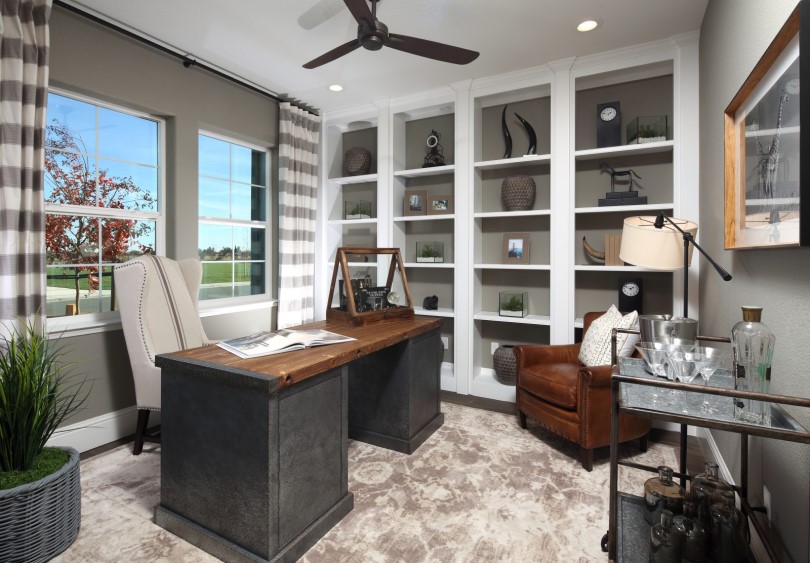
Even if you have a window where you get natural light during the day, you’ll still need some sort of light source if you’re reading in the evening. Employ floor lamps or tabletop fixtures for reading light and be sure to choose a bright bulb, often called day bulbs, which range from 5,000K – 6,500K.
Consider using accent lighting to elevate the ambiance of your space. Art or display lighting is easy to install and provides the right kind of ambient lighting. Install them at the top of your shelves for a sophisticated look with great functionality so you can easily find a book.
